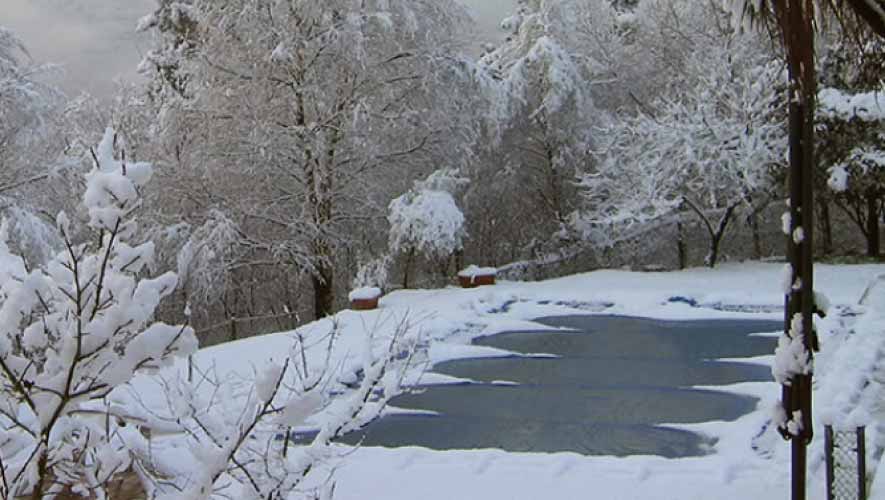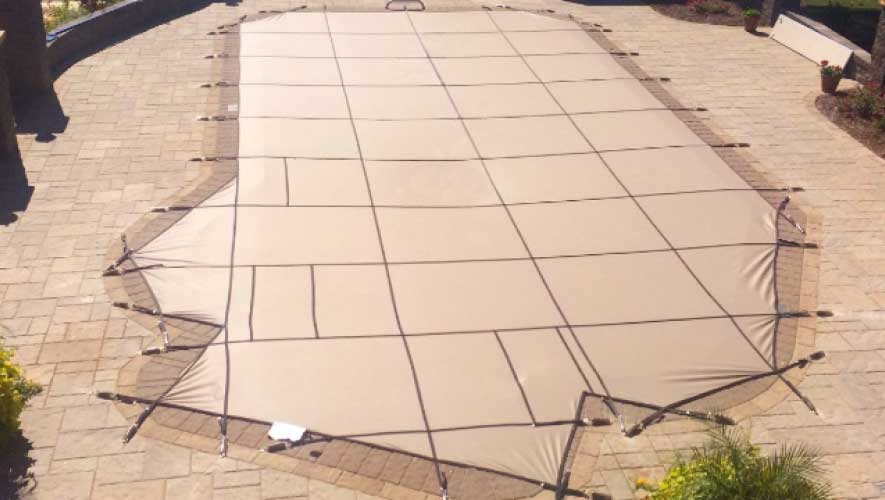Yes, winter pool maintenance is required regardless of location, pool type, or surface material. Neglecting it can lead to equipment damage, chemical imbalance, algae growth, and costly repairs. Proper winter care ensures a clean and functional pool at spring opening and extends system lifespan. Maintenance varies by climate zone, pool type (above-ground or in-ground), and cladding (plaster, tile, PVC membrane (for example, 60 mil pool liner), fiberglass).

Climate Zone Guidelines
| Zone | Example Regions | Winter Lows | Core Tasks |
| Warm (USDA 9–11) | Florida, Southern California, Arizona | Rarely below 20°F | Keep the pool open or lightly covered. Run pump 2–4 hrs weekly. Test and balance water monthly. |
| Mild (USDA 7–8) | Carolinas, Pacific Northwest, Texas | 10–20°F | Partial winterization. Cover pool. Check water every 2 weeks. Drain lines if freezing forecast. |
| Transitional (USDA 5–6 | Midwest, Virginia, Colorado | 0–10°F | Full winterization. Blow out lines, add antifreeze. Check cover monthly for snow/ice. |
| Cold (USDA 3–4) | Northeast, Minnesota, North Dakota | Below 0°F | Complete shutdown. Drain equipment. Use air pillows. Inspect cover every 2–3 weeks. |
Pool Type: Above-Ground vs. In-Ground
| Feature | Above-Ground | In-Ground |
| Drain Level in Cold Climate | Below return jets | 12–18 inches below skimmer |
| Cover | Reinforced tarp + air pillow | Safety mesh or solid cover with water bags |
| Freeze Risk | High | Low, but plumbing vulnerable |
| Snow Load | Remove snow promptly | Use cover rated for 500+ lbs/sq ft |
Cladding-Specific Requirements
Plaster
- Water Chemistry: Calcium 200–275 ppm, alkalinity 100–150 ppm, pH 7.2–7.6.
- Drain: 12–18 inches below skimmer (in-ground pool).
- Risk: Etching if calcium drops; scaling if too high.
- Action: Increase calcium before closing. Use winter algaecide.
Tile
- Water Chemistry: Calcium <250 ppm, chlorine 1–3 ppm.
- Drain: 12–18 inches below skimmer.
- Risk: Tile pop-off from ice expansion.
- Action: Use expansion pillows.

Thick PVC Membrane
- Water Chemistry: Alkalinity 80–120 ppm, pH 7.2–7.6.
- Drain: Keep full (in-ground); 4–6 inches below skimmer (above-ground).
- Risk: Fading if chlorine >5 ppm long-term.
- Action: Use enzyme cleaner.
Fiberglass
- Water Chemistry: Calcium <150 ppm, pH 7.2–7.4.
- Drain: Never below skimmer (risk of shell pop-up from groundwater in spring).
- Risk: Structural damage if drained in frozen ground.
- Action: Maintain high water level. Blow out and cap lines.

Standard Winterization Steps for All Pools
- Clean thoroughly – brush, vacuum, skim.
- Balance water – test pH, alkalinity, calcium, chlorine.
- Shock pool – raise chlorine to 10 ppm.
- Add winter algaecide and stain preventer.
- Drain equipment – pump, filter, heater, chlorinator.
- Blow out lines – use shop vac or compressor (60 PSI max.)
- Add pool-grade antifreeze to plumbing (non-toxic, -50°F rated).
- Install cover – secure tightly, remove standing water/snow.
- Monthly checks – inspect cover, water level, chemistry (if open).

Key Notes by Region & Material
- Warm climate: Operate normally or reduce filtration. Full winterization is not required.
- Cold climate: Complete shutdown required. Freeze protection is a priority.
- Above-ground pools: More vulnerable to wind and collapse. Use extra tie-downs.
- In-ground pools: Focus on plumbing and water balance.
- Thick PVC membrane and fiberglass: Minimal winter maintenance due to non-porous surfaces.
- Plaster and tile: Require strict water chemistry to prevent surface damage.
Professional vs. DIY Closing
- DIY: $100–$300 (chemicals, antifreeze, cover care)
- Professional Closing: $250–$600 (includes blow-out, chemicals, inspection)
- Recommended: Hire pros in cold climates or for complex systems.

Have Questions?
Talk to our specialist! Just fill out the form, and we’ll give you a call!
Conclusion
Winter pool maintenance is mandatory. Tailor your approach to climate, pool type, and surface material. A few hours of preparation now prevents thousands in repairs later. Follow the guidelines above for a smooth, cost-effective offseason and a ready-to-use pool in spring. Free consultation on pool maintenance is available at SAKKO POOL. Our specialists will answer all your questions. Have you had issues with winter maintenance? Let us know, and we’ll help ease your concerns.
